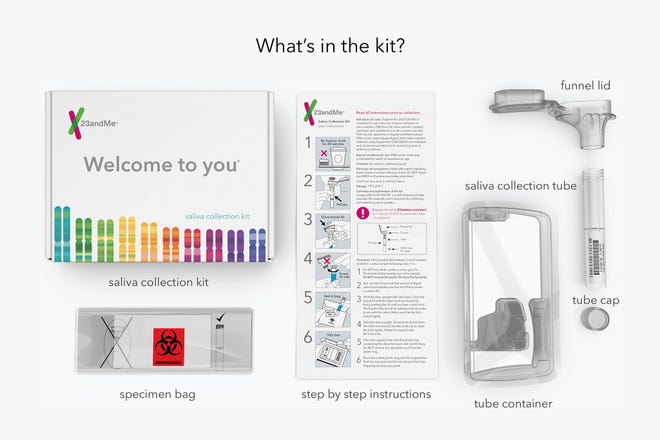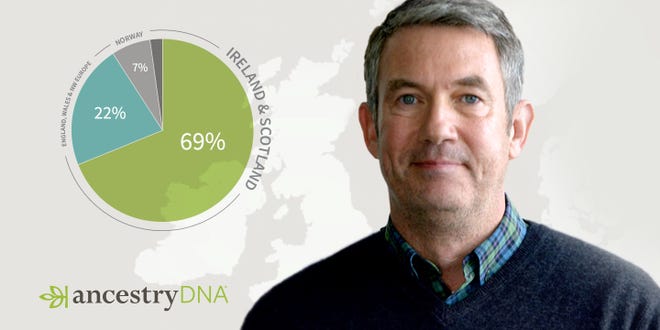How to Connect Family in 23 and Me
Deoxyribonucleic acid testing is all about unlocking secrets. But sometimes surrendering your saliva may likewise mean surrendering a chip of privacy – yours or someone else's.
"I recall people need to exist prepared and warned that they might find out something that could make them very uncomfortable," said Jeff Hettinger, 1 of the growing number of people who submitted a sample and discovered a sibling he never knew existed. His dad had never told him.
Deoxyribonucleic acid testing from the likes of leading services 23andMe and Beginnings, amongst others, has e'er boiled down to take chances and reward, a fascination and curiosity most 1's roots and/or predispositions to affliction, balanced against trepidations around privacy, security, and, for sure, the possibility of an awkward or identity-altering discovery.
Yet rising concerns of data breaches or an overreach past law enforcement have made some people reticent nearly voluntarily spitting into a tube or taking a swab of the cheek, fifty-fifty equally this popular pastime continues to grow.
Information technology also has some of the top Deoxyribonucleic acid testing companies in the manufacture banding together to put privacy front and middle.
MIT Technology Review estimates more than than 26 meg people take taken an in-home ancestry examination.
The DNA risks to uncovering secrets
But experts counsel DNA newbies to consider what for some could turn into an unpleasant flip side.
"Are there secrets in the family?" asks Whitney Ducaine, director of cancer genetics services at InformedDNA in St. Petersburg, Florida, who knows of cases where individuals establish out they hadno biological connection to people they had believed were claret relatives.
James Hazel, research fellow at Vanderbilt University Medical Center, raises some other issue that may cut both ways: "The ability of people to readily place anonymous sperm donors who wished to remain bearding when they provided that sample."
Amazon privacy:Amazon is watching, listening and tracking yous. How to stop information technology
Target teacher discount: It'south coming dorsum with more ways to relieve
On the health forepart, 23andMe asks customers to affirmatively "opt-in" before receiving sensitive reports that may evidence a genetic predisposition for BRCA variants, which may indicate an increased cancer hazard, or belatedly-onset Alzheimer'south Disease, says Adriana Embankment, the company'due south corporate counsel for privacy.

Could someone steal my identity from DNA details?
Meanwhile, frequent reports of database ruptures in all areas of tech and business are likely to give pause to people wondering nigh genealogy information landing in the easily of identity thieves and scam artists. Seeking out distant relatives also ways you, or your data, may accept to exist exposed to some degree, and so that you, in turn, can exist found.
A year ago, the MyHeritage testing service, best-selling a breach of email addresses and "hashed," or scrambled, passwords of more than 92 1000000 users that turned upwardly on a private server the previous Oct.
The company'southward so-chief information security officeholder Omer Deutsch said that no other sensitive data, including family trees and Dna, was compromised since such data is stored on separate systems.
Nevertheless, the episode sounded alarm bells.
"We haven't really seen any reporting surrounding a security breach involving the genetic data of customers in the Usa with any of these big ancestry or wellness-testing companies," Hazel says. But "as the databases grow in size, they represent an increasingly valuable target to potential hackers or others who may wish to gain access to that info."
Even so, Hazel and others think the greater take chances to privacy and security is more probable to come not from genetics data merely from all the other information that can be establish on the cyberspace, including Social Security numbers, passport data and financial records.
"If someone wanted to work with y'all on identity theft, there are a lot of easier ways to exercise it than to try to figure out your great-grandparents," agrees David Nicholson, co-founder of the Living Deoxyribonucleic acid testing service in the U.K.
When police use these DNA databases
Privacy advocates take besides flagged major concerns around the use of DNA by police force enforcement.
DNA forensics have helped solve decades-old cold cases, leading notably to the arrest of the suspected "Golden State Killer" in California.
Investigators were able to uncover clues via the public database GEDMatch, which hosts data people voluntarily upload from individual testing services equally a way to detect matches with potential relatives who tested their DNA elsewhere.
The worry, though, is that by permitting law enforcement to poke around such DNA databases, a legal shadow may exist cast over innocent family members, some of whom never fifty-fifty submitted their Deoxyribonucleic acid anywhere, much less gave their blessing to exist searched by the police.
"Yous make up one's mind to contribute your DNA to one of these services and yous have by default included your parents, your siblings if you have any, your kids if you have whatever or your future kids, and future nieces, nephews and everybody else," says Jen King, director of consumer privacy at Stanford Police force Schoolhouse's Middle for Internet and Society.
DNA testing:The top companies offer testing to learn about your family unit
Family TreeDNA faced a backlash before this yr later on acknowledging that it cooperated with the FBI on crime solving. The authorities were able to gear up profiles on the site hoping to lucifer DNA samples collected from crime scenes.
But I didn't sign upwardly for this...
Family TreeDNA subsequently changed its privacy policy allowing users to opt out so that their DNA could not be matched up against such profiles.
GEDMatch also recently changed its policy. Information technology now requires people to specifically state if they'll let their data to be shared with law enforcement.
"Prior to that time, we had always warned our users in our terms of service that our site might be used by some for purposes other than genealogy," says co-creator Curtis Rogers, who insists at that place are many misconceptions virtually GEDMatch.
"Criminal suspects are non identified on our database," Rogers says. Rather, "genetic genealogy is merely the showtime of a long-complicated process that if ultimately successful will lead to a person or persons of interest. Law enforcement still have to do a consummate investigation, oft including getting a traditional DNA sample, before they tin name a suspect and brand an arrest."
Such investigations may involve social media, demography information, family unit trees, newspaper articles, cemetery records and courthouse records.
Rogers adds that the family history site surfaces matches, not the Dna itself, the raw data of which is encrypted and used to make up one's mind those matches.

For its part, Ancestry, which has sold more than 15 million DNA kits, insists on a search warrant or court guild if investigators request DNA data on a customer, says main privacy officer Eric Heath. Even then the company may challenge the order. Were that to happen, Heath says, it will notify the customer in question, unless ordered otherwise by the courts.
The reality is that such requests are rare.
In its 2018 transparency study, Ancestry says it received just 10 "valid" requests from police enforcement for user data. Information technology provided data on seven of those requests, all related to investigations involving credit card misuse, fraud and identity theft. The study indicated that Ancestry received no valid requests for information related to genetic information of any member and the company did non disclose whatever such information to police enforcement.
It added that as of the end of final twelvemonth, Ancestry has never received a classified request related to the national security laws of the U.South. or any other nation.
In its ain transparency report, 23andMe also said it hasn't received such a national security request. It too resists law enforcement requests when legally possible.
Promoting privacy effectually Deoxyribonucleic acid
Last year, Beginnings, 23andMe, Helix, MyHeritage, Habit, African Beginnings and Living Deoxyribonucleic acid joined upwards with the not-profit The Future of Privacy Forum around a set of best practices for consumer genetic testing services. Amid them: The companies agreed to promote transparency, while also giving consumers control over how their information is nerveless, accessed, corrected, used in inquiry, and deleted.
Around those same guidelines, Ancestry, 23andMe and Helix before this calendar month formed The Coalition For Genetic Data Protection to anteroom "for reasonable and compatible privacy regulation that volition ensure the responsible and ethical handling of every person's genetic data."
"We understand that the trust of our users is paramount to the success of the business organization," Heath of Ancestry says.
Heath advises consumers considering this or that Deoxyribonucleic acid service to read the terms and weather and privacy policies posted on each site, something people typically ignore or have trouble understanding on about sites.
"In every bit much as people become freaked out near Deoxyribonucleic acid, this might be one where it would behoove you to read those documents," he says.
Vanderbilt's Hazel concurs.
In 2017, he researched the policies of 90 companies in the DNA infinite. Results were all over the map: 40% had either no policy bachelor to consumers on their website or policies that did non even mention genetic testing or genetic data. Among the companies that fifty-fifty had a visible policy, some boiled downwards to a vague sentence or two though Hazel notes that 23andMe posted a far more than comprehensive if at times difficult to cover policy.
Know who yous're doing business with
His research also pointed to a large subset of companies that permit surreptitious genetic testing where people could submit Deoxyribonucleic acid samples that were not their ain –maybe nerveless off a spouse's underwear to catch the partner cheating or to covertly determine the parentage of a kid.
(A Google search for "infidelity testing DNA" pulls up a number of these companies.)

Nicholson of Living DNA also urges consumers to check out the privacy policies of the companies. He says companies that may sell Dna testing at a much lower cost compensate past attempting to monetize the data.
"Are you looking for a service as cheap as possible simply (one where) your data may be shared or sold? Or are y'all looking for a company (like ours) where yous may pay a fiddling bit more than, just that data is individual, prophylactic and secure?" Living DNA test kits price $99.
Even as he hasn't taken any steps to further unravel the secrets of his unknown half-blood brother, Hettinger has no second thoughts about his 23andMe test. "I would even so do it and I would all the same encourage others to practise it," says the 49-yr-old from Atlanta.
Tracing your family unit and health roots via DNA can bring rich rewards. Merely make sure those rewards match your tolerance for risk, privacy, and awkward surprises.
Electronic mail: ebaig@usatoday.com Follow @edbaig on Twitter
Source: https://www.usatoday.com/story/tech/2019/07/04/is-23-andme-ancestry-dna-testing-worth-it/1561984001/
0 Response to "How to Connect Family in 23 and Me"
Post a Comment